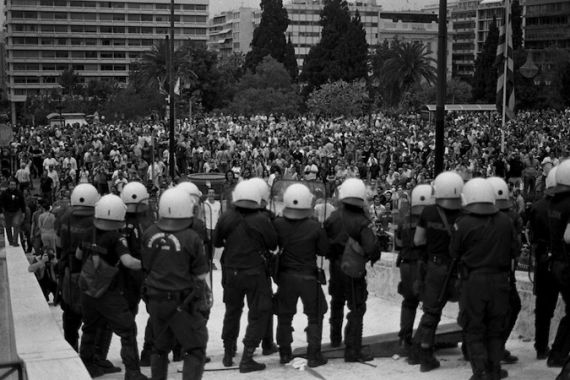Athenian space battles
The Golden Dawn wishes to occupy public space in the heart of the Greek capital, “to purify and to control it”.

On May 2, 2013, members of Golden Dawn (GD) – Greece’s Nazi-reminiscent party currently polling at approximately 11-13 percent of popular vote – attempted to stage yet another one of their infamous “Greek-only” food handouts which have granted the party part of the unprecedented publicity it has been enjoying in the year since first entering the country’s parliament in May 2012.
GD was to stage the handout at Syntagma (Constitution) square, Athens’ most central public space – and undoubtedly the one holding the most symbolic value: from May 2010 onwards, virtually all major actions of popular discontent against the measures imposed by the IMF/EU/ECB troika have taken place here.
The unapologetically racist GD food handouts have been organised ever since the party’s sky-rocketing to power last year, yet it was only now that Giorgos Kaminis – the city’s mayor elected on a social-democrat/centrist left platform – appeared to take a stance: on the eve of the event, Kaminis announced that the GD’s “hatred soup kitchen” was unlicensed and that he would do everything in his authority to ban it.
True to his word he averted the event, with the aid of squads of Greek riot police (the infamous MAT: intriguingly, the same force that saw its members vote for GD in excess of 50 percent in both 2012 national elections). A few hours following the ban, and with GD having moved the handout to their old headquarters by Athens’ central train station, Giorgos Germenis – an elected GD MP – attempted to physically assault Kaminis. Germenis missed and hit a 12-year-old girl instead, before trying to draw a gun on Kaminis.
Ever since the events, progressive public discourse in the country has largely focused on praise for the supposedly anti-racist motives of Kaminis and the impunity enjoyed by the Golden Dawn. Even though Greek MPs largely enjoy parliamentary immunity, physical assault falls under the “flagrant crime” category – and so Germenis should have been arrested by police who merely witnessed the assault instead.
But what lies behind the events of May 2 extends much beyond the (already significantly troubling) immunity GD enjoys by a police force that is in its majority supportive of their action. A key question here is: why did Kaminis decide to take action now? And on what grounds?
|
|
| Police shut down Greek-only soup kitchen |
Kaminis himself offered three reasons for banning the handout: the event’s explicit racism, its illegal nature (no permit had been requested). The third reason, most intriguingly, was that such handouts would “give public opinion the wrong message, that is, that the country’s capital is faced with a generalised condition of impoverishment”. The fact that such a generalised condition of impoverishment is, in fact, what Athens and the rest of the Greek territory is faced with, would seem to escape the mayor – but for all his previous, apparent indecisiveness, Kaminis has just proven to hold a very acute understanding of the social reality surrounding him.
Placing a ban on an event revealing the state of impoverishment of populations inside the Greek territory dictates a simple, if clear message: that the existing plexus of power will not allow, in its steeply authoritarian turn, any space. First, it was no space for dissent: it was Kaminis, once again, who ordered and led the brutal repression of the Syntagma Square demonstrations in the summer of 2011, once again aesthetic grounds.
Nearly two years later, the ban extends not only to discontent against the repression and impoverishment that the local population is faced with, but even to any signs of this repression and impoverishment per se.
What happened on May 2, then, might very well be one of the opening scuffles to a peculiar battle for space about to unfold in the Athenian territory. On the one hand, in pure Nazi style, the GD wishes to occupy public space in the heart of the Greek capital, to purify and to control it.
While trying to significantly shift the existing plexus of power, then, the GD has at the same time safeguarded that a large part of the plexus in question already has its support. On the other hand, this existing plexus of power is undergoing a transformation of its own: conscious of challenges to its authority that may and will arise in the near future, it solidifies its grip – identifying and stamping upon any loci of potential future unrest.
For all their seeming disparity, the line separating the two lines is far from discreet. Worst, and most crucially, there is a common denominator: neither intends to allow any space for the Other. Over three decades ago, sociologist Richard Sennett had praised the “uses of disorder” of the city, lashing out against the middle classes for leaving the centre for the suburbs – “afraid to live in a world they cannot control”.
Rather than crouching around the existing, ever-totalitarian plexus of power and the red herring that is its supposedly “democratic” consciousness, those of us believing in the use of urban disorder would be better to prepare ourselves for the ferocious battles ahead.
Antonis Vradis is part of the collective project The City at the Time of Crisis, a member of the Occupied London collective and Alternatives Editor of the journal CITY.
You can follow the editor on Twitter: @nyktweets
